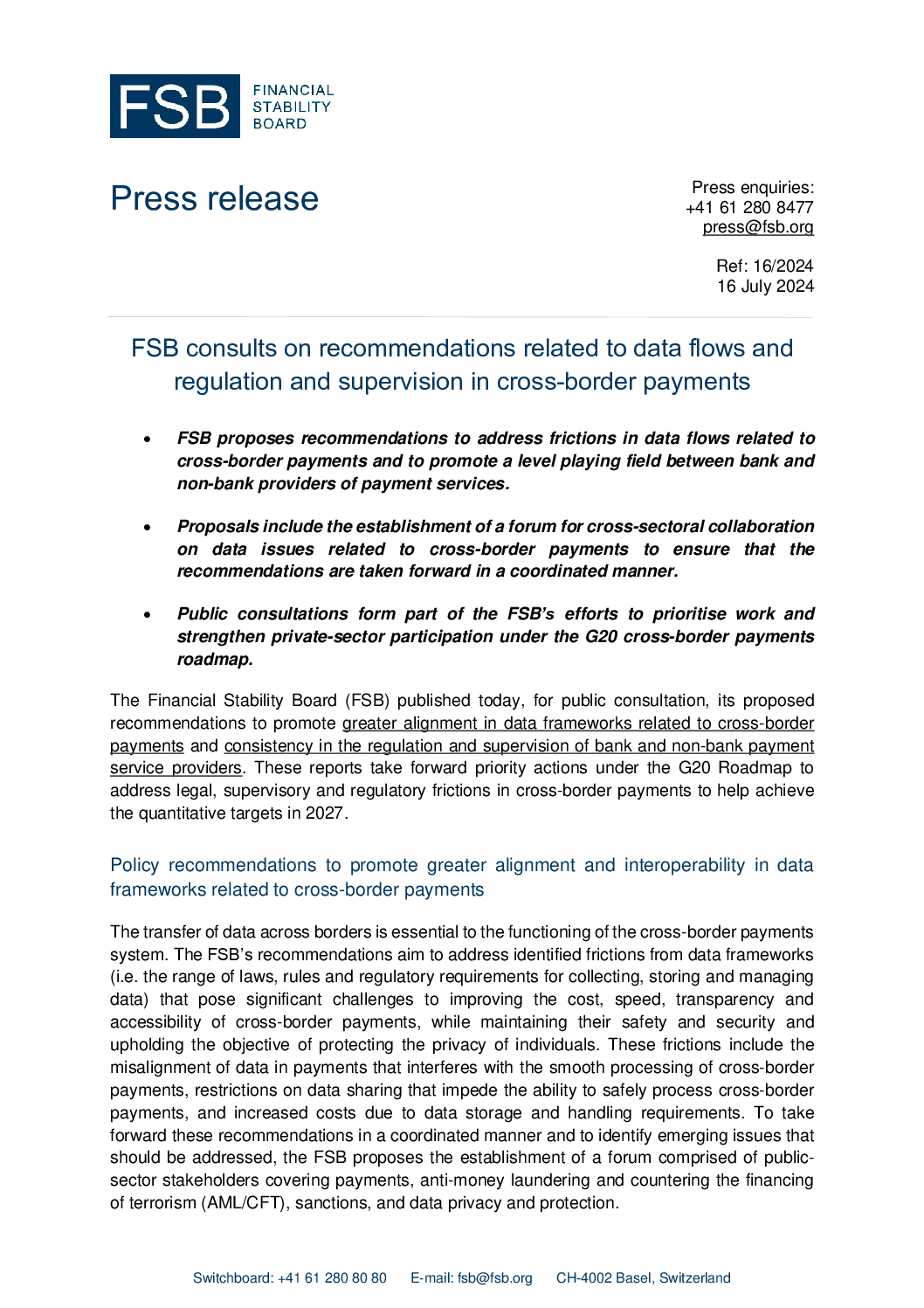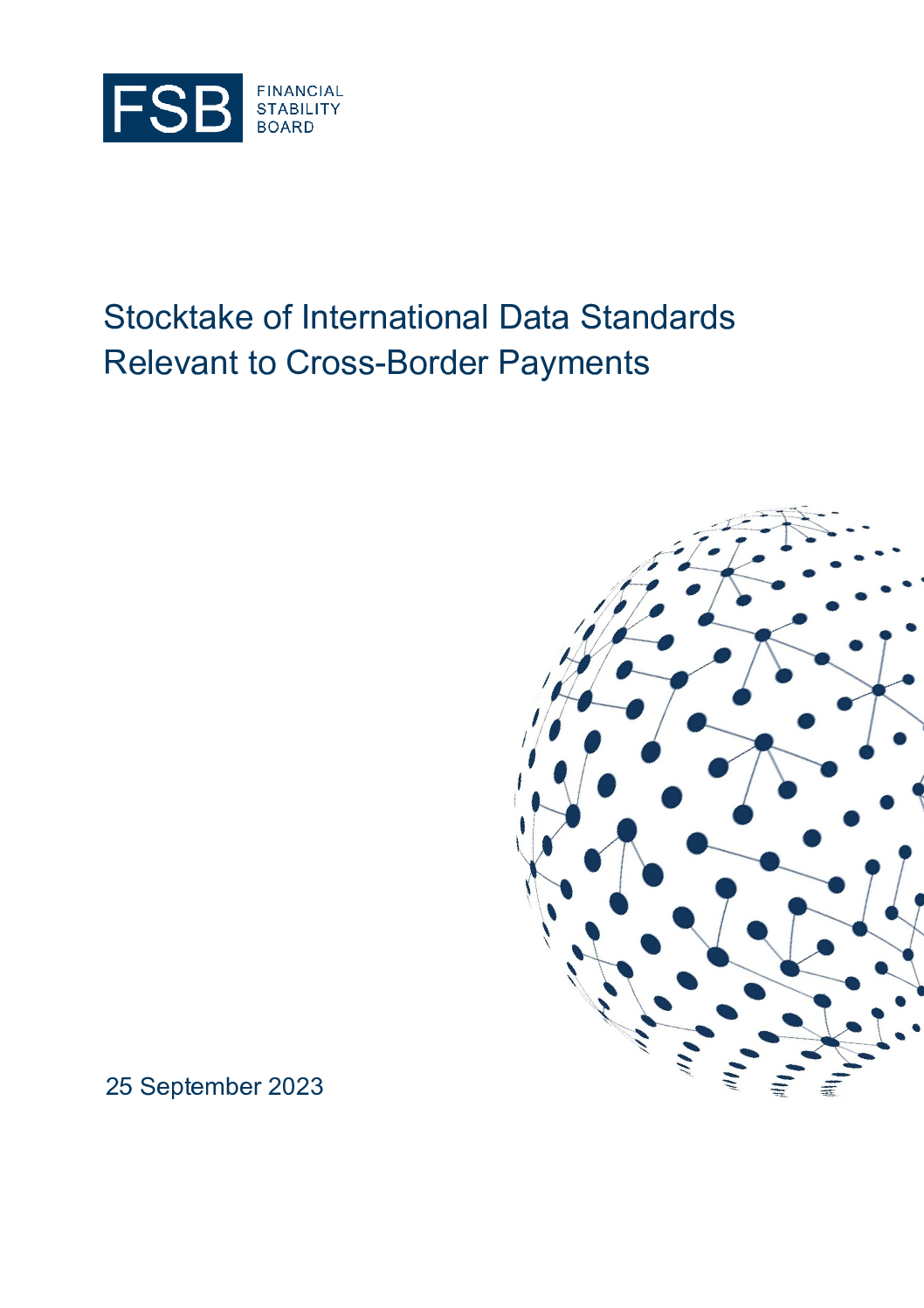Summary of document history
Enhancing the interaction between data frameworks and cross-border payments is a priority action to move forward the G20 Roadmap for Enhancing Cross-Border Payments.
In February 2023, the FSB set out its priority actions to take the G20 Cross-border Payments Roadmap forward. These actions included work to enhance the interaction between laws, rules, and regulatory requirements for collecting, storing and managing data (referred to as “data frameworks”) related to cross-border payments.
The FSB took stock of national and regional data frameworks relevant to the functioning, regulation and supervision of cross-border payments. The stocktake identified a number of frictions between data frameworks that pose significant challenges to improving the cost, speed, transparency and accessibility of cross-border payments.
This report sets out recommendations for promoting alignment and interoperability across data frameworks applicable to cross-border payments. The recommendations aim to mitigate unintended frictions in cross-border payments while avoiding compromising on the underlying objectives of data frameworks (such as preserving the security of transactions, meeting anti-money laundering and countering the financing of terrorism (AML/CFT) and sanctions objectives, and protecting the privacy of individuals).
The recommendations fall into four broad categories:
- Addressing uncertainty about how to balance regulatory and supervisory obligations.
- Promoting the alignment and interoperability of regulatory and data requirements related to cross-border payments.
- Mitigating restrictions on the flow of data related to payments across borders.
- Reducing barriers to innovation.
The FSB invites comments on this consultation report and welcomes replies to the questions set out below. Responses will be published on the FSB’s website unless respondents expressly request otherwise.
Questions for consultation
General
- Is the proposed scope of the recommendations appropriate for addressing frictions arising from data frameworks in cross-border payments?
- What, if any, additional issues related to data frameworks in cross-border payments, beyond those identified in the consultative report, should be addressed to help achieve the G20 Roadmap objectives for faster, cheaper, more accessible and more transparent cross-border payments?
- Is the proposed role of the Forum (i.e. coordinating implementation work for the final recommendations and addressing existing and newly emerging issues) appropriate?
Section 1: Addressing uncertainty about how to balance regulatory and supervisory obligations
- Discussions with industry stakeholders highlighted some uncertainties about how to balance AML/CFT data requirements and data privacy and protection rules. Do you experience similar difficulties with other types of “data frameworks” that could be addressed by the Forum? If so, please specify.
- What are your suggestions about how the Forum, if established, should address uncertainties about how to balance regulatory and supervisory obligations?
- Are the recommendations sufficiently flexible to accommodate different approaches to implementation while achieving the stated objectives?
Section 2: Promoting the alignment and interoperability of regulatory and data requirements related to cross-border payments
- The FSB and CPMI have looked to increase adoption of standardised legal entity identifiers and harmonised ISO 20022 requirements for enhancing cross-border payments. Are there any additional recommendation/policy incentives that should be considered to encourage increased adoption of standardised legal entity identifiers and the CPMI’s harmonised ISO 20022 data requirements?
- Recommendation 4 calls for the consistent implementation of AML/CFT data requirements, on the basis of the FATF standards (FATF Recommendation 16 in particular) and related guidance. It also calls for the use of global data standards if and when national authorities are requiring additional information. Do you have any additional suggestions on AML/CFT data-related issues? If so, please specify.
- Industry feedback highlights that uneven regulatory expectations for sanctions compliance create significant frictions in cross-border payments affecting the Roadmap objectives. What actions should be considered to address this issue?
- Do the recommendations sufficiently balance policy objectives related to the protection of individuals’ data privacy and the safety and efficiency of cross-border payments?
Section 3: Mitigating restrictions on the flow of data related to payments across borders
- The FSB understands that fraud is an increasing challenge in cross-border payments. Do the recommendations sufficiently support the development of data transfer tools that specifically address fraud?
- Is there any specific sectoral- or jurisdiction-specific example that you would suggest the FSB to consider with respect to regulation of cross-border data flows?
Section 4: Reducing barriers to innovation
- How can the public sector best promote innovation in data-sharing technologies to facilitate the reduction of related frictions and contribute to meeting the targets on cross-border payments in 2027?
- Do you have any further feedback not captured by the questions above?
Responses should be submitted via this secure online form by 9 September 2024.
Please contact the FSB ([email protected]) if you have questions.

